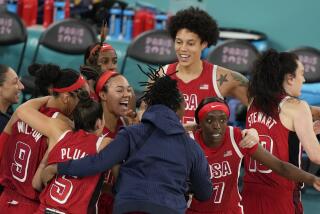NOTES : U.S. Has the Hang of Larger Rink, Coach Says
- Share via
Dave Peterson, U.S. Olympic hockey coach, says his team has adjusted to the larger ice rinks in Europe after a grueling North American schedule.
After beating France, 6-3, Tuesday night in Megeve, the United States will play Sweden tonight in Chamonix. Sweden won the world championship last year over the Soviet Union. The United States’ first Olympic game will be against Italy on Sunday.
The U.S. goals Tuesday night were by Ted Drury, Dave Emma, Clark Donatelli, Steve Heinze, Tim Sweeney and Marty McInnis.
After going 17-31-8 in North America, the United States opened in Europe by going 3-1 and winning a six-team tournament in Rouen, France.
Peterson said the Americans got used to the larger ice surface, beating the Sodertalje, Sweden, club team, 5-1, in medal play after losing to it, 6-3, in round-robin play.
“We were more acclimated then,” Peterson said. “We now had some games on the big sheet of ice.”
American rinks usually measure 185 feet long by 85 feet wide. International rinks, like the one on which European teams and all Olympic games are played, are 200 by 100.
Peterson said that extra 15 feet of width meant “a lot of lateral movement, a lot of lateral play.”
“It’s a much more of a puck-control game,” he said.
The German speedskating team, dominated by former East German athletes, has been warned by Germany’s national Olympic committee to avoid overt nationalism during victory celebrations because Germany doesn’t want to rekindle old fears by being seen as a superpower in sports--or any other sphere.
Such a perception might be difficult to avoid. At Calgary in 1988, the East Germans won 25 medals, second only to the Soviet Union’s 29. West Germany won eight medals.
One of the leading candidates to light the Olympic flame during the opening ceremonies is Nathalie Bouvier, second in the women’s downhill at last year’s World Ski Championships, who suffered broken legs in a spill in Japan two months later.
Bouvier suffered bouts of depression during her rehabilitation and finally gave up hopes of competing in Albertville. She wants to compete at the 1994 Winter Olympics in Lillehammer, Norway.
Chinese athletes were unable to celebrate their New Year Tuesday with a bang. Their traditional fireworks were banned for security reasons in the main Olympic Village at Brides-les-Bains.
“We usually have lots of firecrackers, but there will be none tonight. It’s not allowed,” said Chinese team chief Zhang Quan Sheng.
More to Read
Go beyond the scoreboard
Get the latest on L.A.'s teams in the daily Sports Report newsletter.
You may occasionally receive promotional content from the Los Angeles Times.






